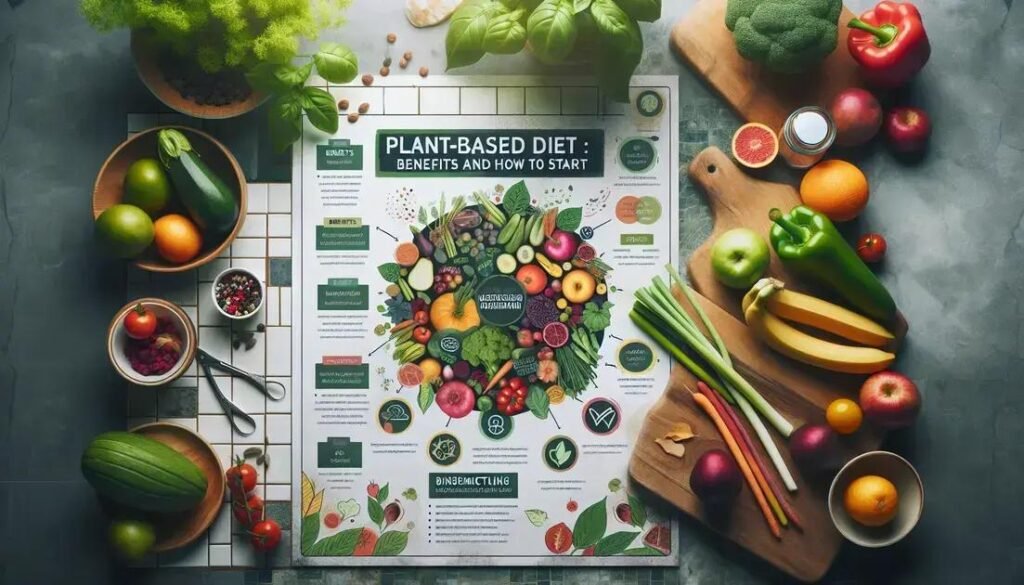Are you curious about the plant-based diet trend and how it can impact your health? With the growing body of research highlighting the numerous benefits of a plant-based diet, it’s no wonder why more and more individuals are making the switch.
As a result, it’s essential to understand the science behind this diet and how it can improve your overall well-being.
In this article, we’ll delve into the surprising benefits of a plant-based diet, dispel common myths, and provide a comprehensive guide on how to transition to this lifestyle.
Table of Contents
Introduction to Plant-Based Diet
A plant-based diet is a type of eating pattern that focuses on consuming foods derived from plants, including fruits, vegetables, whole grains, legumes, nuts, and seeds.
This diet excludes or minimizes foods derived from animals, such as meat, dairy products, eggs, and honey.
Plant-based diets have been shown to have numerous health benefits, including reducing the risk of chronic diseases like heart disease, type 2 diabetes, and certain types of cancer.
Additionally, plant-based diets tend to be high in fiber, vitamins, and minerals, which can lead to improved digestive health and immune function.
The Science Behind Plant-Based Diet
Plant-based diets have garnered significant attention in recent years, with numerous scientific studies shedding light on their potential health benefits.
A 2019 meta-analysis published in the Journal of the American Heart Association found that plant-based diets are associated with a significant reduction in the risk of cardiovascular disease.
Additionally, a 2020 study published in the Journal of Nutrition discovered that plant-based diets may help reduce the risk of type 2 diabetes by up to 23%. These findings have been replicated across various populations and studies, solidifying the scientific evidence behind the benefits of a plant-based diet.
Benefits of Plant-Based Diet
A plant-based diet has been linked to numerous health benefits, including weight loss, improved blood sugar control, and reduced inflammation.
Studies have also shown that plant-based diets are associated with a lower risk of chronic diseases, such as heart disease, type 2 diabetes, and certain types of cancer.
Furthermore, plant-based diets tend to be high in fiber, vitamins, and minerals, which can lead to improved digestive health and immune function.
Additionally, a plant-based diet can also have a positive impact on the environment, as it tends to have a lower carbon footprint and requires fewer resources.
With the numerous benefits of a plant-based diet, it’s no wonder why many individuals are making the switch.
Transitioning to a Plant-Based Diet
Transitioning to a plant-based diet can be a gradual process, and it’s essential to approach it in a way that works best for your lifestyle.
Start by incorporating one or two plant-based meals into your daily routine and gradually increase the number of plant-based meals as you become more comfortable with the diet.
It’s also crucial to plan your meals in advance to ensure you have the necessary ingredients and to reduce food waste.
Additionally, consider consulting with a registered dietitian or a healthcare professional for personalized guidance and support.
With time and patience, transitioning to a plant-based diet can be a rewarding and life-changing experience.
Common Misconceptions About Plant-Based Diet
One of the most common misconceptions about plant-based diets is that they are restrictive and lacking in essential nutrients. However, this couldn’t be further from the truth. Plant-based diets can be incredibly diverse and offer a wide range of nutrient-dense foods.
Another misconception is that plant-based diets are only for vegans, when in reality, anyone can benefit from incorporating more plant-based meals into their diet.
Additionally, some people believe that plant-based diets are too expensive, but with a little planning and creativity, it’s possible to follow a plant-based diet on a budget.
By understanding and addressing these common misconceptions, individuals can make more informed decisions about their diet and reap the numerous benefits of a plant-based lifestyle.
Conclusion: Embracing a Plant-Based Lifestyle
Embracing a plant-based lifestyle is not just about cutting out animal products, it’s about adopting a new way of living that prioritizes your health, the environment, and animal welfare.
It’s about being mindful of the food you eat and the impact it has on the world around you. By making conscious choices about your diet, you can create a positive ripple effect that benefits not just yourself, but also your community and the planet.
As you continue on your plant-based journey, remember to be patient, stay informed, and celebrate your successes along the way.
With time and practice, adopting a plant-based lifestyle can become a natural and enjoyable part of your daily routine, leading to a happier, healthier, and more sustainable you.
Frequently Asked Questions about Plant-Based Diet
What are the benefits of a plant-based diet?
A plant-based diet has been shown to have numerous health benefits, including weight loss, improved blood sugar control, and reduced inflammation. It can also help reduce the risk of chronic diseases, such as heart disease, type 2 diabetes, and certain types of cancer.
Is a plant-based diet expensive?
No, a plant-based diet does not have to be expensive. With a little planning and creativity, it’s possible to follow a plant-based diet on a budget. Plant-based protein sources like beans, lentils, and tofu are often less expensive than meat, and whole grains like brown rice and quinoa are a cost-effective alternative to processed grains.
Can I get enough protein on a plant-based diet?
Yes, it’s easy to get enough protein on a plant-based diet. Plant-based protein sources like beans, lentils, tofu, and tempeh are all high in protein and can be incorporated into a variety of dishes. You can also get protein from plant-based milk and yogurt alternatives.
How do I transition to a plant-based diet?
Transitioning to a plant-based diet can be easy and enjoyable. Start by incorporating one or two plant-based meals into your daily routine and gradually increase the number of plant-based meals as you become more comfortable with the diet. You can also consult with a registered dietitian or a healthcare professional for personalized guidance and support.
Are plant-based diets limited in terms of food options?
No, plant-based diets offer a wide range of food options. You can enjoy a variety of fruits, vegetables, whole grains, legumes, nuts, and seeds. You can also find plant-based versions of your favorite foods, such as vegan cheese and vegan meat alternatives.
How do I get enough omega-3 fatty acids on a plant-based diet?
Omega-3 fatty acids are important for heart health, and there are several plant-based sources of omega-3s, including flaxseeds, chia seeds, walnuts, and canola oil. You can also consider taking a plant-based omega-3 supplement or consulting with a registered dietitian or a healthcare professional for personalized advice.



